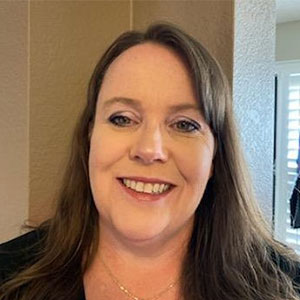Fowler Accounting Grad Fights Financial Crime
Fowler Accounting Grad Fights Financial Crime

SDSU accounting graduate, Karen Gurgel, is a special agent for the IRS.
It’s like putting together all the pieces of a jigsaw puzzle.
That is how SDSU Fowler College of Business alumna, Karen Gurgel (’97, Accounting), describes her work as a special agent with the Internal Revenue Service (IRS).
Gurgel locates and assembles facts that can lead to the conviction of people accused of income tax evasion or fraud, racketeering, money laundering and other financial crimes. “The cases are similar to puzzles in the sense that there are multiple pieces you have to find and put together to get the complete picture,” she explained. “Each case is unique with its own facts and circumstances, so each day tends offer a different set of details.”
We recently talked with Gurgel about her career with the IRS and how the lessons she learned as an SDSU student have helped her in that role. Here’s what she shared:
Q: What prompted you to attend SDSU?
A: I had heard good things about SDSU from my sister who also attended SDSU. Once I was in San Diego, I became familiar with the campus while taking classes at Grossmont College and knew SDSU was where I wanted to transfer to finish my bachelor’s degree.
Q: Why did you choose to major in accounting?
A: When my family moved the summer before my junior year of high school, I needed to take an extra class when I registered for school. My dad suggested I try an accounting class because I’d always liked numbers. After that, I was hooked!
Q: Where did you work before joining the IRS?
A: I worked as a trustee sales officer and bankruptcy specialist for a foreclosure company while I was still a student at SDSU and for a couple of years after graduation. After an individual would stop making mortgage payments for a period of time, our office would complete foreclosure proceedings on borrowers who didn’t bring their mortgage payments up to date.
Q: How did you get your start with the IRS?
A: I had always been interested in learning more about the IRS. I saw an IRS employee give a presentation while I was at SDSU, however, they said there was a hiring freeze, so I figured it wasn’t an option at the time. I still filled out an application after the presentation which led them send me a packet about the special agent position a few years later. I thought it looked very interesting and after I discussed it with my husband, I decided to apply. I went through the hiring process and now have over 20 years with the service.
Q: Could you tell us a little about one of the more interesting cases you’ve worked on?
A: There was a case with an individual who hadn’t filed tax returns or paid his taxes in over 20 years, but he still earned enough money to own property in Colorado and Hawaii. After he was convicted of tax evasion, he fled to Central America before sentencing. While trying to locate him, other agents and I had to contact witnesses who could only be reached by using a Razor snowmobile. He was eventually located and brought back to the U.S. to be sentenced.
Q: Are there any lessons you learned at SDSU that you still use today?
A: Be thorough and use all the resources you have available to help you with whatever it is you are working on.
Q: What advice would you give current SDSU students who would like to follow in your footsteps as an IRS special agent?
A: Grades are important, so finish strong. A law enforcement background isn’t required for this job, but be inquisitive, ask questions, and be proactive.
For recent SDSU graduates with an interest in becoming a special agent with the IRS, Gurgel pointed out that the service is continually seeking college graduates to join their ranks. “We currently have a year-long open announcement posted,” she said. “The announcement discusses the various requirements for the position which include a bachelor’s degree in any major, along with 15 semester hours of accounting and nine semester hours of other related business classes.”

